Entrepreneurship Report: Ventures, Impact, Personality, and Skills
VerifiedAdded on 2023/01/09
|15
|3772
|54
Report
AI Summary
This report delves into the multifaceted world of entrepreneurship, examining various types of entrepreneurial ventures, including small business entrepreneurship, scalable start-up entrepreneurship, large entrepreneurship, and social entrepreneurship. It analyzes the differences and similarities between these ventures, providing insights into their operational dynamics. The report assesses the impact of micro and small businesses on the economy, supported by relevant data and statistics, highlighting their contribution to job creation, productivity, and economic growth. Furthermore, it explores the significance of small businesses and start-ups in the social economy, emphasizing their role in technological advancement, job creation, and fostering innovation. The report also discusses the attributes, traits, and skills that differentiate entrepreneurs from managers, along with an examination of entrepreneurial personality and motivation. Finally, it considers the background and experiences that shape entrepreneurs, offering a comprehensive overview of the entrepreneurial landscape.

Entrepreneurship and
Small Business
Management
Small Business
Management
Paraphrase This Document
Need a fresh take? Get an instant paraphrase of this document with our AI Paraphraser
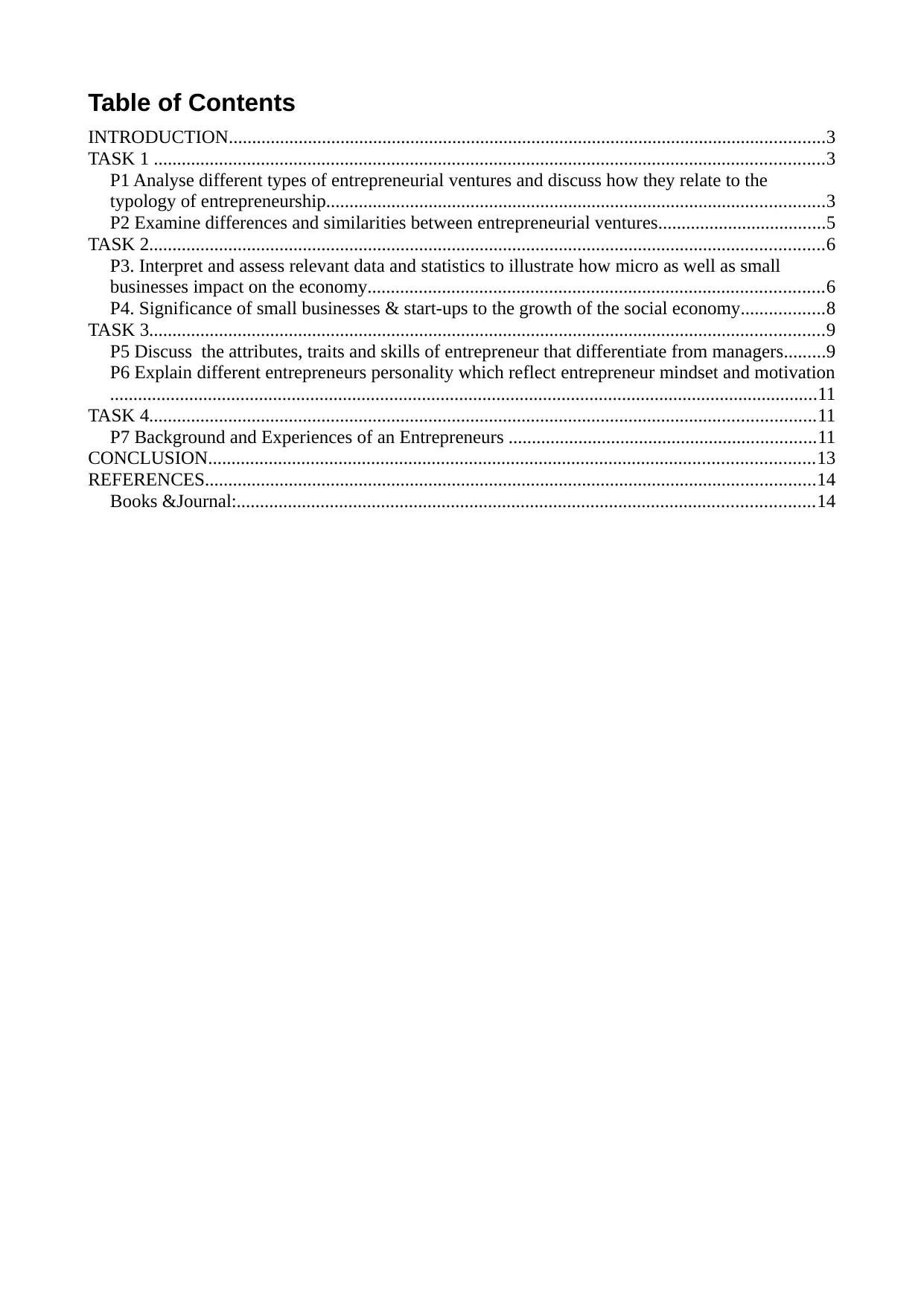
Table of Contents
INTRODUCTION................................................................................................................................3
TASK 1 ................................................................................................................................................3
P1 Analyse different types of entrepreneurial ventures and discuss how they relate to the
typology of entrepreneurship...........................................................................................................3
P2 Examine differences and similarities between entrepreneurial ventures....................................5
TASK 2.................................................................................................................................................6
P3. Interpret and assess relevant data and statistics to illustrate how micro as well as small
businesses impact on the economy..................................................................................................6
P4. Significance of small businesses & start-ups to the growth of the social economy..................8
TASK 3.................................................................................................................................................9
P5 Discuss the attributes, traits and skills of entrepreneur that differentiate from managers.........9
P6 Explain different entrepreneurs personality which reflect entrepreneur mindset and motivation
........................................................................................................................................................11
TASK 4...............................................................................................................................................11
P7 Background and Experiences of an Entrepreneurs ..................................................................11
CONCLUSION..................................................................................................................................13
REFERENCES...................................................................................................................................14
Books &Journal:............................................................................................................................14
INTRODUCTION................................................................................................................................3
TASK 1 ................................................................................................................................................3
P1 Analyse different types of entrepreneurial ventures and discuss how they relate to the
typology of entrepreneurship...........................................................................................................3
P2 Examine differences and similarities between entrepreneurial ventures....................................5
TASK 2.................................................................................................................................................6
P3. Interpret and assess relevant data and statistics to illustrate how micro as well as small
businesses impact on the economy..................................................................................................6
P4. Significance of small businesses & start-ups to the growth of the social economy..................8
TASK 3.................................................................................................................................................9
P5 Discuss the attributes, traits and skills of entrepreneur that differentiate from managers.........9
P6 Explain different entrepreneurs personality which reflect entrepreneur mindset and motivation
........................................................................................................................................................11
TASK 4...............................................................................................................................................11
P7 Background and Experiences of an Entrepreneurs ..................................................................11
CONCLUSION..................................................................................................................................13
REFERENCES...................................................................................................................................14
Books &Journal:............................................................................................................................14
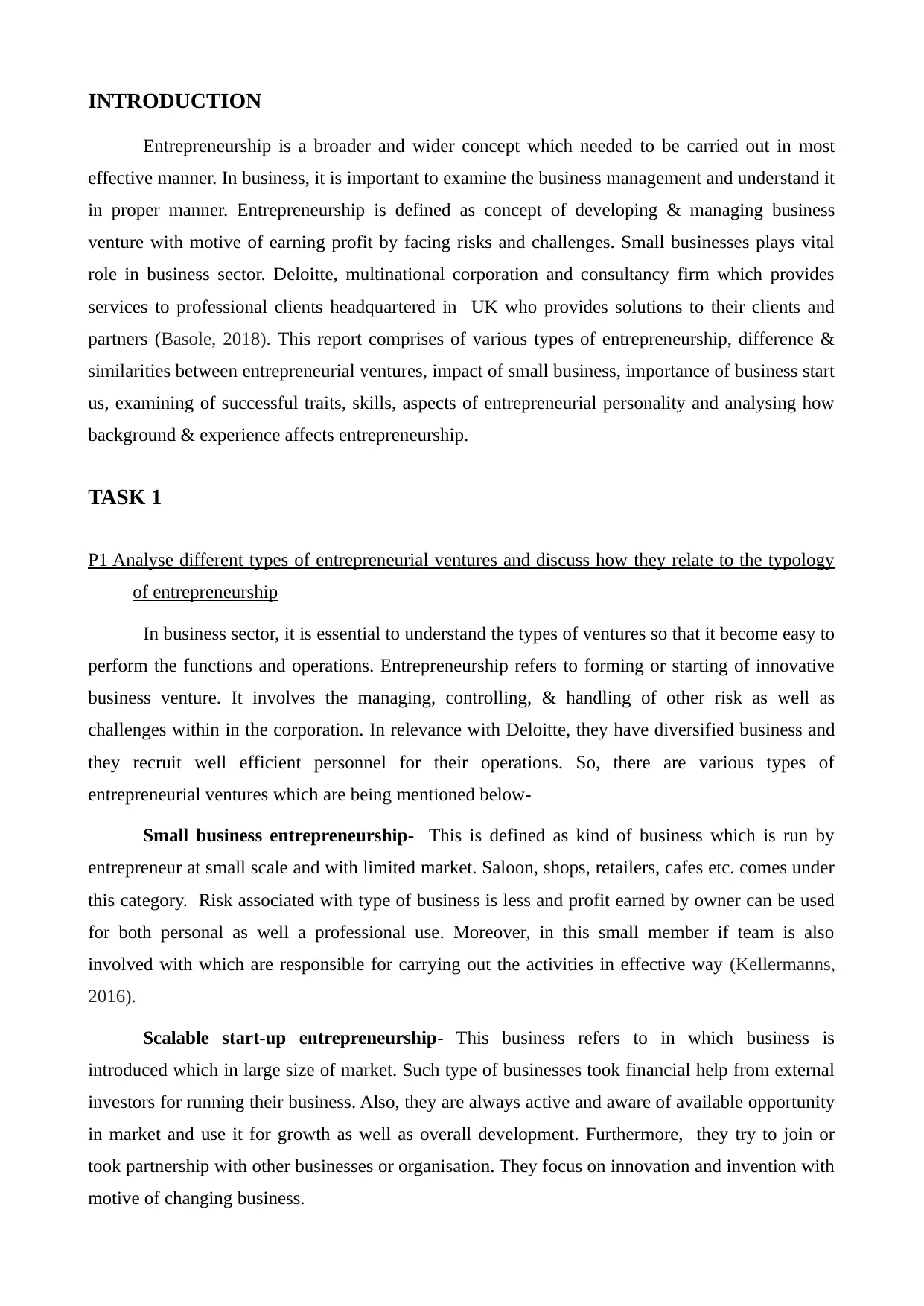
INTRODUCTION
Entrepreneurship is a broader and wider concept which needed to be carried out in most
effective manner. In business, it is important to examine the business management and understand it
in proper manner. Entrepreneurship is defined as concept of developing & managing business
venture with motive of earning profit by facing risks and challenges. Small businesses plays vital
role in business sector. Deloitte, multinational corporation and consultancy firm which provides
services to professional clients headquartered in UK who provides solutions to their clients and
partners (Basole, 2018). This report comprises of various types of entrepreneurship, difference &
similarities between entrepreneurial ventures, impact of small business, importance of business start
us, examining of successful traits, skills, aspects of entrepreneurial personality and analysing how
background & experience affects entrepreneurship.
TASK 1
P1 Analyse different types of entrepreneurial ventures and discuss how they relate to the typology
of entrepreneurship
In business sector, it is essential to understand the types of ventures so that it become easy to
perform the functions and operations. Entrepreneurship refers to forming or starting of innovative
business venture. It involves the managing, controlling, & handling of other risk as well as
challenges within in the corporation. In relevance with Deloitte, they have diversified business and
they recruit well efficient personnel for their operations. So, there are various types of
entrepreneurial ventures which are being mentioned below-
Small business entrepreneurship- This is defined as kind of business which is run by
entrepreneur at small scale and with limited market. Saloon, shops, retailers, cafes etc. comes under
this category. Risk associated with type of business is less and profit earned by owner can be used
for both personal as well a professional use. Moreover, in this small member if team is also
involved with which are responsible for carrying out the activities in effective way (Kellermanns,
2016).
Scalable start-up entrepreneurship- This business refers to in which business is
introduced which in large size of market. Such type of businesses took financial help from external
investors for running their business. Also, they are always active and aware of available opportunity
in market and use it for growth as well as overall development. Furthermore, they try to join or
took partnership with other businesses or organisation. They focus on innovation and invention with
motive of changing business.
Entrepreneurship is a broader and wider concept which needed to be carried out in most
effective manner. In business, it is important to examine the business management and understand it
in proper manner. Entrepreneurship is defined as concept of developing & managing business
venture with motive of earning profit by facing risks and challenges. Small businesses plays vital
role in business sector. Deloitte, multinational corporation and consultancy firm which provides
services to professional clients headquartered in UK who provides solutions to their clients and
partners (Basole, 2018). This report comprises of various types of entrepreneurship, difference &
similarities between entrepreneurial ventures, impact of small business, importance of business start
us, examining of successful traits, skills, aspects of entrepreneurial personality and analysing how
background & experience affects entrepreneurship.
TASK 1
P1 Analyse different types of entrepreneurial ventures and discuss how they relate to the typology
of entrepreneurship
In business sector, it is essential to understand the types of ventures so that it become easy to
perform the functions and operations. Entrepreneurship refers to forming or starting of innovative
business venture. It involves the managing, controlling, & handling of other risk as well as
challenges within in the corporation. In relevance with Deloitte, they have diversified business and
they recruit well efficient personnel for their operations. So, there are various types of
entrepreneurial ventures which are being mentioned below-
Small business entrepreneurship- This is defined as kind of business which is run by
entrepreneur at small scale and with limited market. Saloon, shops, retailers, cafes etc. comes under
this category. Risk associated with type of business is less and profit earned by owner can be used
for both personal as well a professional use. Moreover, in this small member if team is also
involved with which are responsible for carrying out the activities in effective way (Kellermanns,
2016).
Scalable start-up entrepreneurship- This business refers to in which business is
introduced which in large size of market. Such type of businesses took financial help from external
investors for running their business. Also, they are always active and aware of available opportunity
in market and use it for growth as well as overall development. Furthermore, they try to join or
took partnership with other businesses or organisation. They focus on innovation and invention with
motive of changing business.
⊘ This is a preview!⊘
Do you want full access?
Subscribe today to unlock all pages.

Trusted by 1+ million students worldwide
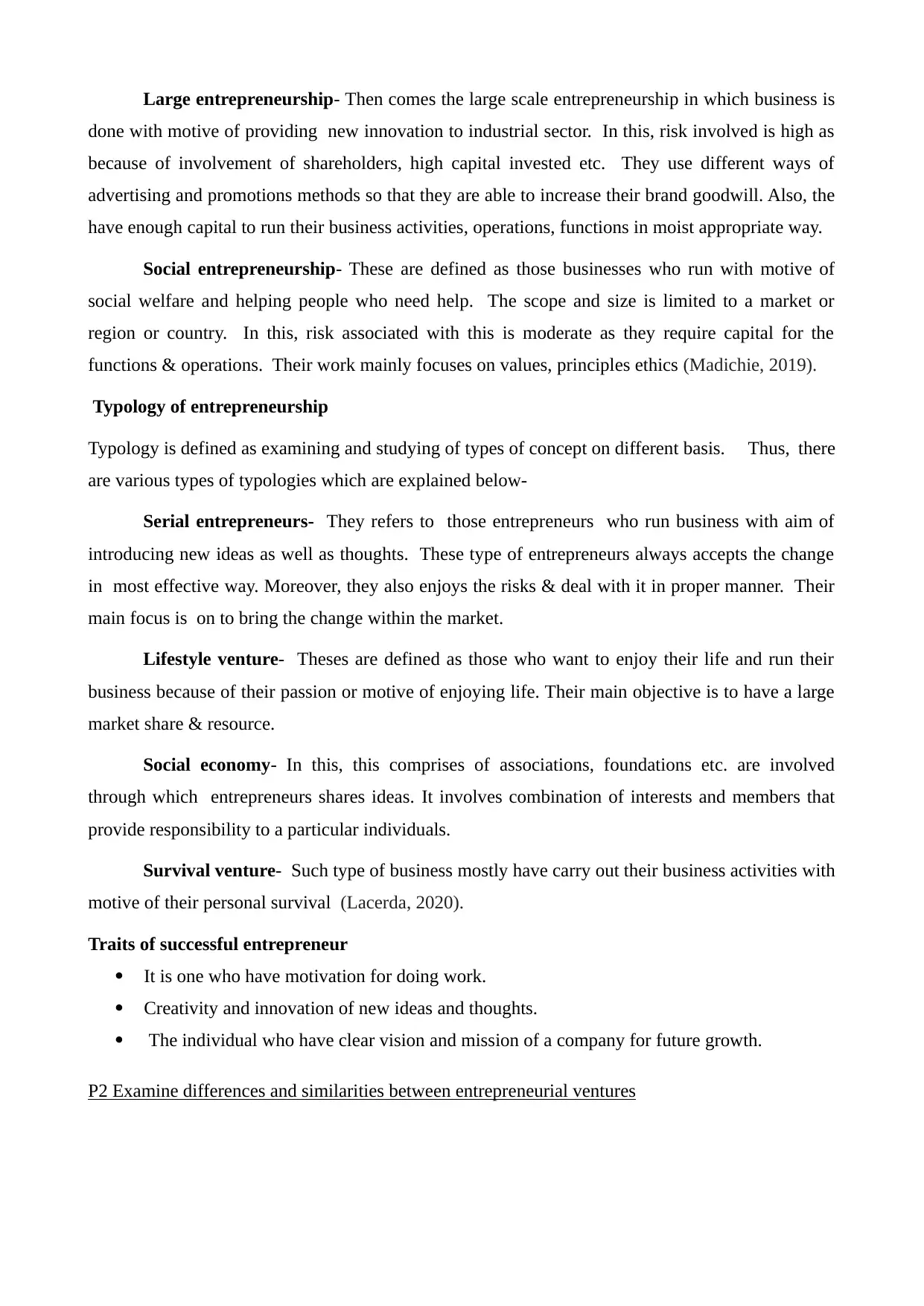
Large entrepreneurship- Then comes the large scale entrepreneurship in which business is
done with motive of providing new innovation to industrial sector. In this, risk involved is high as
because of involvement of shareholders, high capital invested etc. They use different ways of
advertising and promotions methods so that they are able to increase their brand goodwill. Also, the
have enough capital to run their business activities, operations, functions in moist appropriate way.
Social entrepreneurship- These are defined as those businesses who run with motive of
social welfare and helping people who need help. The scope and size is limited to a market or
region or country. In this, risk associated with this is moderate as they require capital for the
functions & operations. Their work mainly focuses on values, principles ethics (Madichie, 2019).
Typology of entrepreneurship
Typology is defined as examining and studying of types of concept on different basis. Thus, there
are various types of typologies which are explained below-
Serial entrepreneurs- They refers to those entrepreneurs who run business with aim of
introducing new ideas as well as thoughts. These type of entrepreneurs always accepts the change
in most effective way. Moreover, they also enjoys the risks & deal with it in proper manner. Their
main focus is on to bring the change within the market.
Lifestyle venture- Theses are defined as those who want to enjoy their life and run their
business because of their passion or motive of enjoying life. Their main objective is to have a large
market share & resource.
Social economy- In this, this comprises of associations, foundations etc. are involved
through which entrepreneurs shares ideas. It involves combination of interests and members that
provide responsibility to a particular individuals.
Survival venture- Such type of business mostly have carry out their business activities with
motive of their personal survival (Lacerda, 2020).
Traits of successful entrepreneur
It is one who have motivation for doing work.
Creativity and innovation of new ideas and thoughts.
The individual who have clear vision and mission of a company for future growth.
P2 Examine differences and similarities between entrepreneurial ventures
done with motive of providing new innovation to industrial sector. In this, risk involved is high as
because of involvement of shareholders, high capital invested etc. They use different ways of
advertising and promotions methods so that they are able to increase their brand goodwill. Also, the
have enough capital to run their business activities, operations, functions in moist appropriate way.
Social entrepreneurship- These are defined as those businesses who run with motive of
social welfare and helping people who need help. The scope and size is limited to a market or
region or country. In this, risk associated with this is moderate as they require capital for the
functions & operations. Their work mainly focuses on values, principles ethics (Madichie, 2019).
Typology of entrepreneurship
Typology is defined as examining and studying of types of concept on different basis. Thus, there
are various types of typologies which are explained below-
Serial entrepreneurs- They refers to those entrepreneurs who run business with aim of
introducing new ideas as well as thoughts. These type of entrepreneurs always accepts the change
in most effective way. Moreover, they also enjoys the risks & deal with it in proper manner. Their
main focus is on to bring the change within the market.
Lifestyle venture- Theses are defined as those who want to enjoy their life and run their
business because of their passion or motive of enjoying life. Their main objective is to have a large
market share & resource.
Social economy- In this, this comprises of associations, foundations etc. are involved
through which entrepreneurs shares ideas. It involves combination of interests and members that
provide responsibility to a particular individuals.
Survival venture- Such type of business mostly have carry out their business activities with
motive of their personal survival (Lacerda, 2020).
Traits of successful entrepreneur
It is one who have motivation for doing work.
Creativity and innovation of new ideas and thoughts.
The individual who have clear vision and mission of a company for future growth.
P2 Examine differences and similarities between entrepreneurial ventures
Paraphrase This Document
Need a fresh take? Get an instant paraphrase of this document with our AI Paraphraser
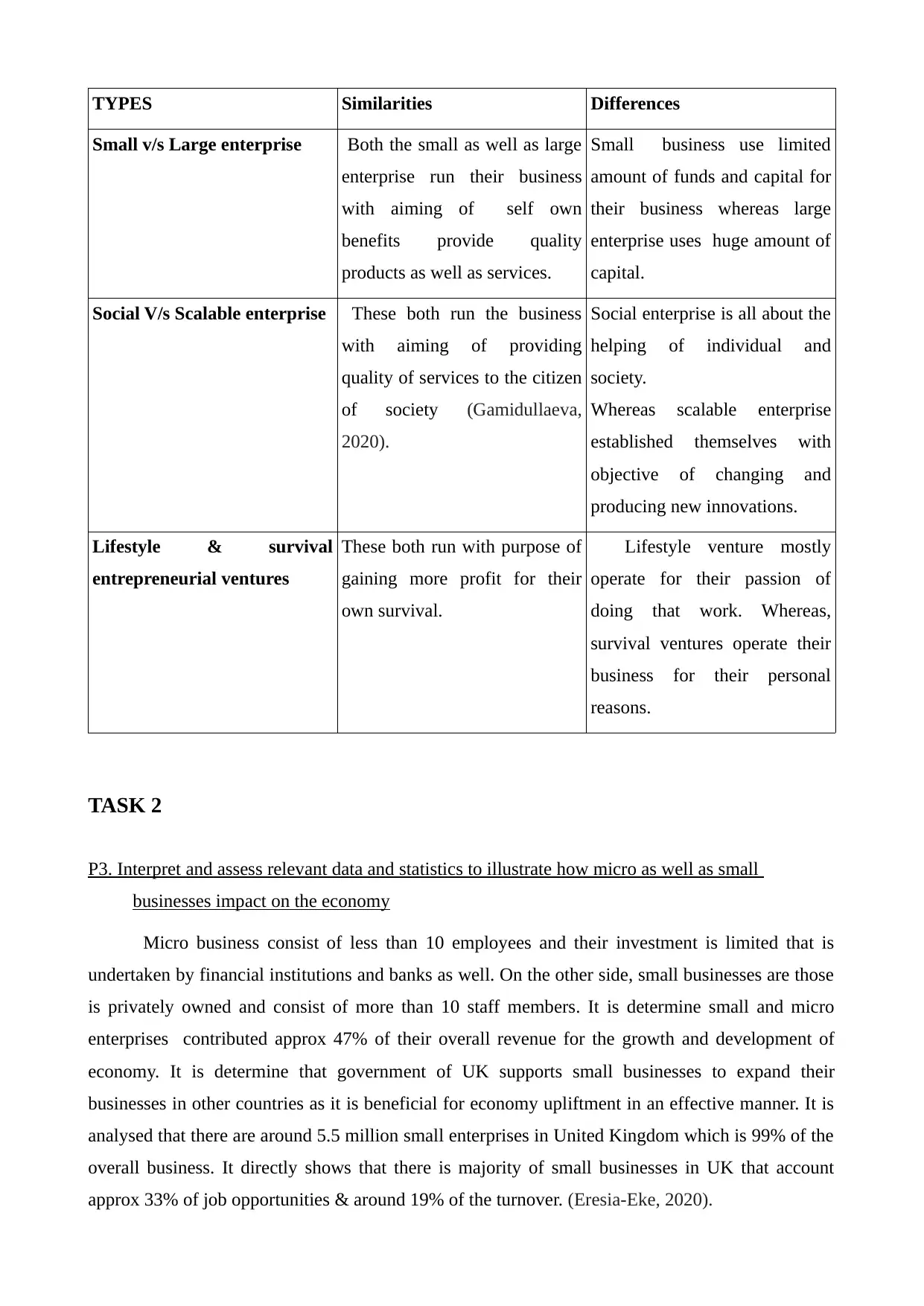
TYPES Similarities Differences
Small v/s Large enterprise Both the small as well as large
enterprise run their business
with aiming of self own
benefits provide quality
products as well as services.
Small business use limited
amount of funds and capital for
their business whereas large
enterprise uses huge amount of
capital.
Social V/s Scalable enterprise These both run the business
with aiming of providing
quality of services to the citizen
of society (Gamidullaeva,
2020).
Social enterprise is all about the
helping of individual and
society.
Whereas scalable enterprise
established themselves with
objective of changing and
producing new innovations.
Lifestyle & survival
entrepreneurial ventures
These both run with purpose of
gaining more profit for their
own survival.
Lifestyle venture mostly
operate for their passion of
doing that work. Whereas,
survival ventures operate their
business for their personal
reasons.
TASK 2
P3. Interpret and assess relevant data and statistics to illustrate how micro as well as small
businesses impact on the economy
Micro business consist of less than 10 employees and their investment is limited that is
undertaken by financial institutions and banks as well. On the other side, small businesses are those
is privately owned and consist of more than 10 staff members. It is determine small and micro
enterprises contributed approx 47% of their overall revenue for the growth and development of
economy. It is determine that government of UK supports small businesses to expand their
businesses in other countries as it is beneficial for economy upliftment in an effective manner. It is
analysed that there are around 5.5 million small enterprises in United Kingdom which is 99% of the
overall business. It directly shows that there is majority of small businesses in UK that account
approx 33% of job opportunities & around 19% of the turnover. (Eresia-Eke, 2020).
Small v/s Large enterprise Both the small as well as large
enterprise run their business
with aiming of self own
benefits provide quality
products as well as services.
Small business use limited
amount of funds and capital for
their business whereas large
enterprise uses huge amount of
capital.
Social V/s Scalable enterprise These both run the business
with aiming of providing
quality of services to the citizen
of society (Gamidullaeva,
2020).
Social enterprise is all about the
helping of individual and
society.
Whereas scalable enterprise
established themselves with
objective of changing and
producing new innovations.
Lifestyle & survival
entrepreneurial ventures
These both run with purpose of
gaining more profit for their
own survival.
Lifestyle venture mostly
operate for their passion of
doing that work. Whereas,
survival ventures operate their
business for their personal
reasons.
TASK 2
P3. Interpret and assess relevant data and statistics to illustrate how micro as well as small
businesses impact on the economy
Micro business consist of less than 10 employees and their investment is limited that is
undertaken by financial institutions and banks as well. On the other side, small businesses are those
is privately owned and consist of more than 10 staff members. It is determine small and micro
enterprises contributed approx 47% of their overall revenue for the growth and development of
economy. It is determine that government of UK supports small businesses to expand their
businesses in other countries as it is beneficial for economy upliftment in an effective manner. It is
analysed that there are around 5.5 million small enterprises in United Kingdom which is 99% of the
overall business. It directly shows that there is majority of small businesses in UK that account
approx 33% of job opportunities & around 19% of the turnover. (Eresia-Eke, 2020).
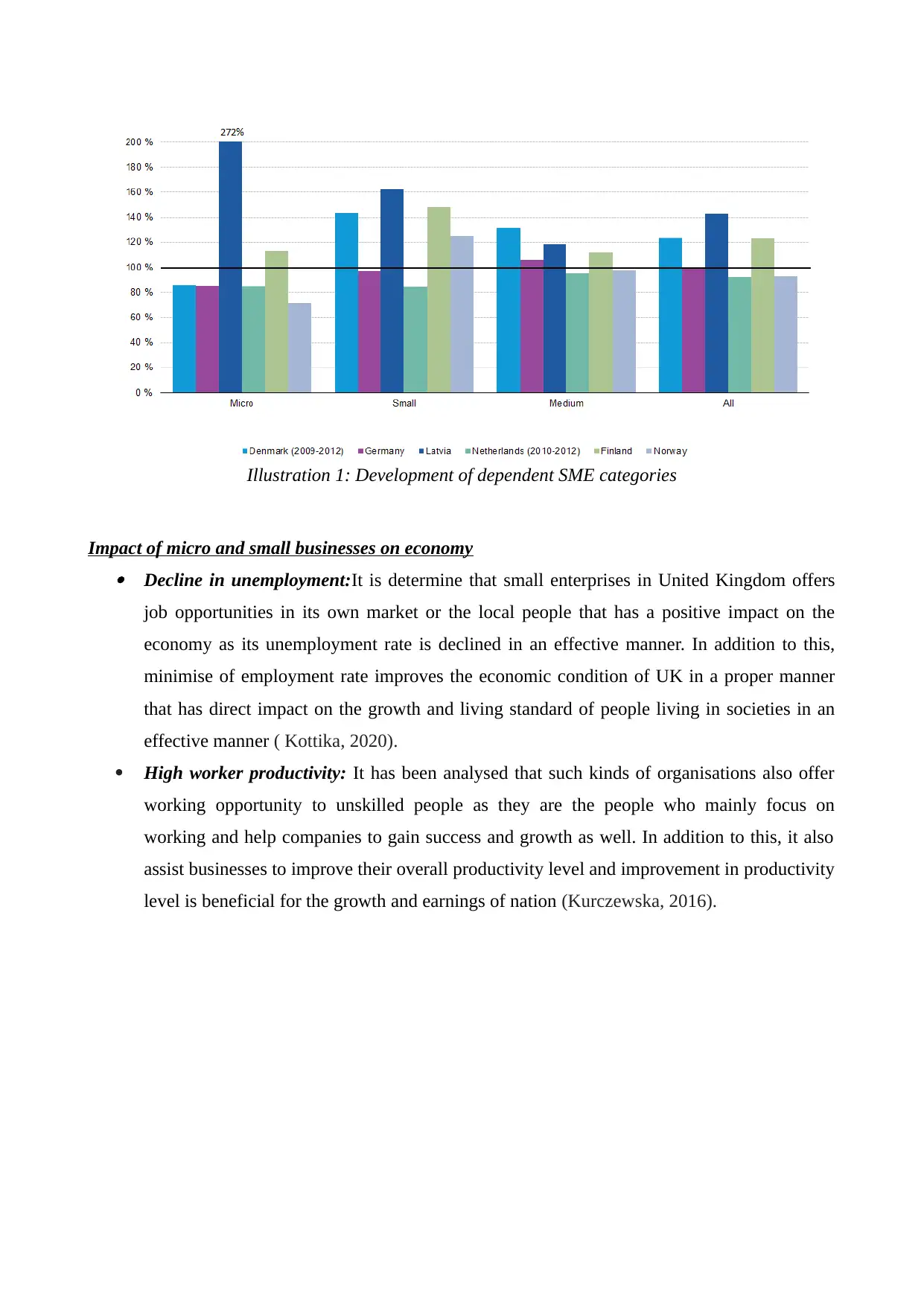
Impact of micro and small businesses on economy Decline in unemployment:It is determine that small enterprises in United Kingdom offers
job opportunities in its own market or the local people that has a positive impact on the
economy as its unemployment rate is declined in an effective manner. In addition to this,
minimise of employment rate improves the economic condition of UK in a proper manner
that has direct impact on the growth and living standard of people living in societies in an
effective manner ( Kottika, 2020).
High worker productivity: It has been analysed that such kinds of organisations also offer
working opportunity to unskilled people as they are the people who mainly focus on
working and help companies to gain success and growth as well. In addition to this, it also
assist businesses to improve their overall productivity level and improvement in productivity
level is beneficial for the growth and earnings of nation (Kurczewska, 2016).
Illustration 1: Development of dependent SME categories
job opportunities in its own market or the local people that has a positive impact on the
economy as its unemployment rate is declined in an effective manner. In addition to this,
minimise of employment rate improves the economic condition of UK in a proper manner
that has direct impact on the growth and living standard of people living in societies in an
effective manner ( Kottika, 2020).
High worker productivity: It has been analysed that such kinds of organisations also offer
working opportunity to unskilled people as they are the people who mainly focus on
working and help companies to gain success and growth as well. In addition to this, it also
assist businesses to improve their overall productivity level and improvement in productivity
level is beneficial for the growth and earnings of nation (Kurczewska, 2016).
Illustration 1: Development of dependent SME categories
⊘ This is a preview!⊘
Do you want full access?
Subscribe today to unlock all pages.

Trusted by 1+ million students worldwide
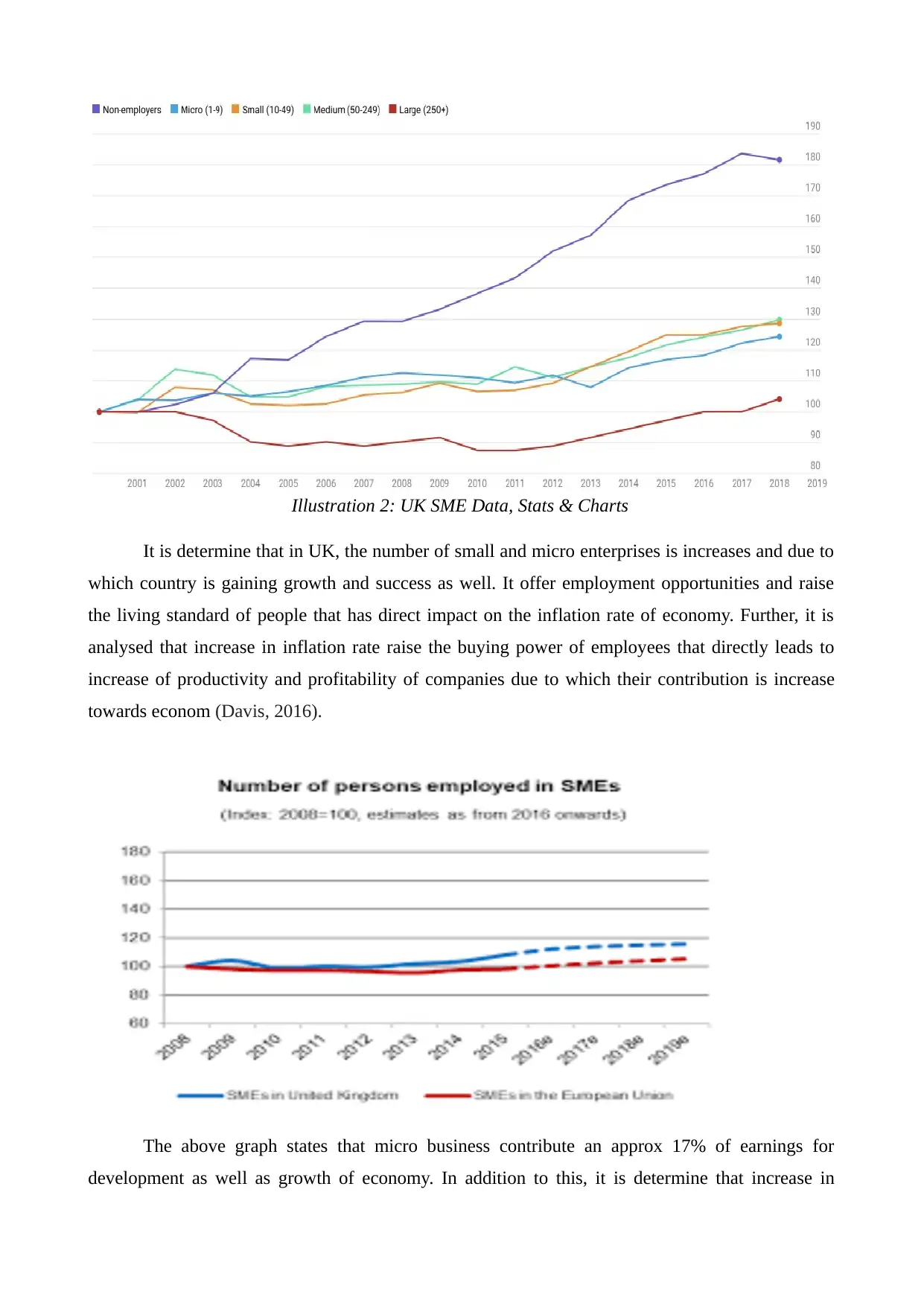
Illustration 2: UK SME Data, Stats & Charts
It is determine that in UK, the number of small and micro enterprises is increases and due to
which country is gaining growth and success as well. It offer employment opportunities and raise
the living standard of people that has direct impact on the inflation rate of economy. Further, it is
analysed that increase in inflation rate raise the buying power of employees that directly leads to
increase of productivity and profitability of companies due to which their contribution is increase
towards econom (Davis, 2016).
The above graph states that micro business contribute an approx 17% of earnings for
development as well as growth of economy. In addition to this, it is determine that increase in
It is determine that in UK, the number of small and micro enterprises is increases and due to
which country is gaining growth and success as well. It offer employment opportunities and raise
the living standard of people that has direct impact on the inflation rate of economy. Further, it is
analysed that increase in inflation rate raise the buying power of employees that directly leads to
increase of productivity and profitability of companies due to which their contribution is increase
towards econom (Davis, 2016).
The above graph states that micro business contribute an approx 17% of earnings for
development as well as growth of economy. In addition to this, it is determine that increase in
Paraphrase This Document
Need a fresh take? Get an instant paraphrase of this document with our AI Paraphraser
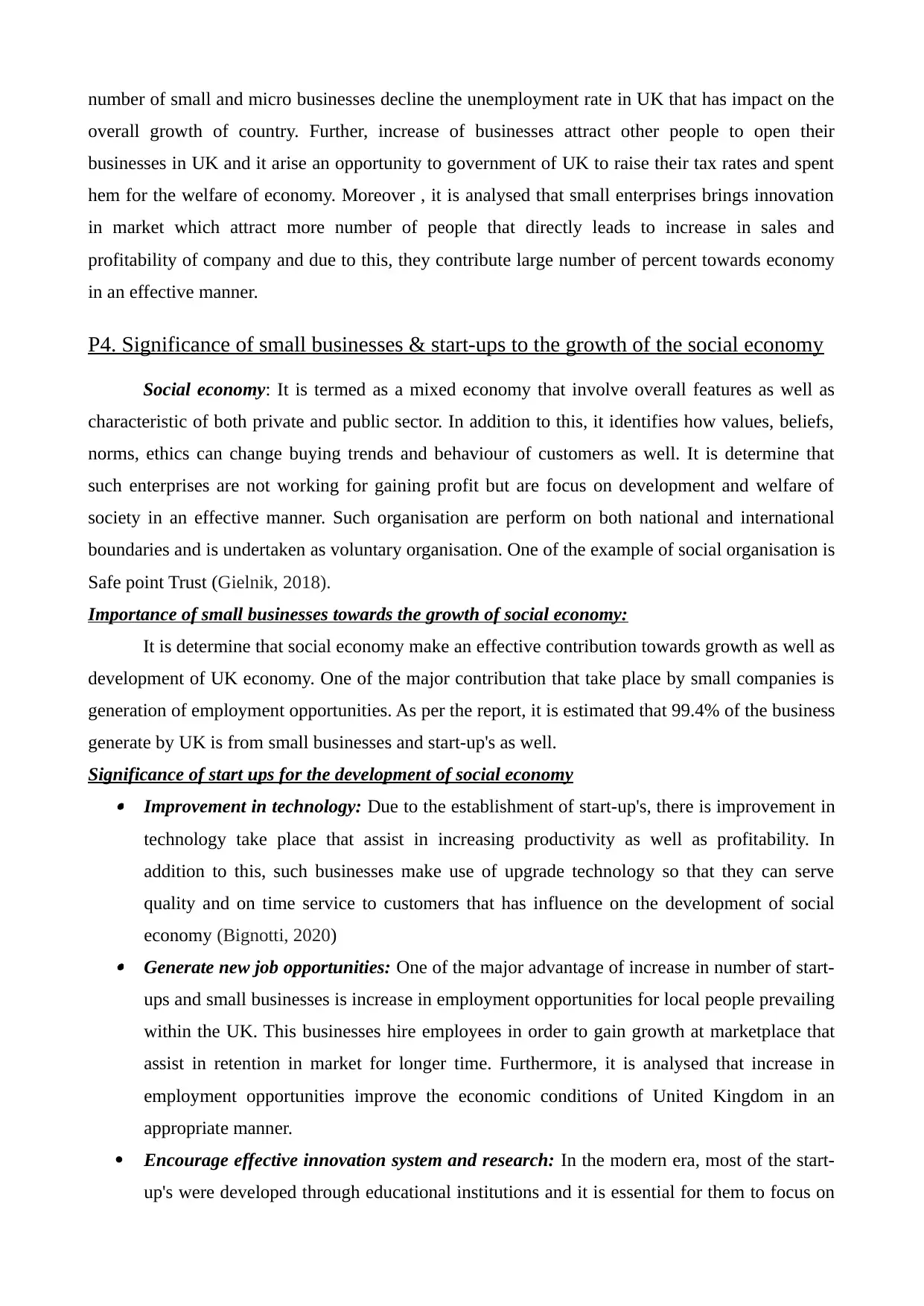
number of small and micro businesses decline the unemployment rate in UK that has impact on the
overall growth of country. Further, increase of businesses attract other people to open their
businesses in UK and it arise an opportunity to government of UK to raise their tax rates and spent
hem for the welfare of economy. Moreover , it is analysed that small enterprises brings innovation
in market which attract more number of people that directly leads to increase in sales and
profitability of company and due to this, they contribute large number of percent towards economy
in an effective manner.
P4. Significance of small businesses & start-ups to the growth of the social economy
Social economy: It is termed as a mixed economy that involve overall features as well as
characteristic of both private and public sector. In addition to this, it identifies how values, beliefs,
norms, ethics can change buying trends and behaviour of customers as well. It is determine that
such enterprises are not working for gaining profit but are focus on development and welfare of
society in an effective manner. Such organisation are perform on both national and international
boundaries and is undertaken as voluntary organisation. One of the example of social organisation is
Safe point Trust (Gielnik, 2018).
Importance of small businesses towards the growth of social economy:
It is determine that social economy make an effective contribution towards growth as well as
development of UK economy. One of the major contribution that take place by small companies is
generation of employment opportunities. As per the report, it is estimated that 99.4% of the business
generate by UK is from small businesses and start-up's as well.
Significance of start ups for the development of social economy Improvement in technology: Due to the establishment of start-up's, there is improvement in
technology take place that assist in increasing productivity as well as profitability. In
addition to this, such businesses make use of upgrade technology so that they can serve
quality and on time service to customers that has influence on the development of social
economy (Bignotti, 2020) Generate new job opportunities: One of the major advantage of increase in number of start-
ups and small businesses is increase in employment opportunities for local people prevailing
within the UK. This businesses hire employees in order to gain growth at marketplace that
assist in retention in market for longer time. Furthermore, it is analysed that increase in
employment opportunities improve the economic conditions of United Kingdom in an
appropriate manner.
Encourage effective innovation system and research: In the modern era, most of the start-
up's were developed through educational institutions and it is essential for them to focus on
overall growth of country. Further, increase of businesses attract other people to open their
businesses in UK and it arise an opportunity to government of UK to raise their tax rates and spent
hem for the welfare of economy. Moreover , it is analysed that small enterprises brings innovation
in market which attract more number of people that directly leads to increase in sales and
profitability of company and due to this, they contribute large number of percent towards economy
in an effective manner.
P4. Significance of small businesses & start-ups to the growth of the social economy
Social economy: It is termed as a mixed economy that involve overall features as well as
characteristic of both private and public sector. In addition to this, it identifies how values, beliefs,
norms, ethics can change buying trends and behaviour of customers as well. It is determine that
such enterprises are not working for gaining profit but are focus on development and welfare of
society in an effective manner. Such organisation are perform on both national and international
boundaries and is undertaken as voluntary organisation. One of the example of social organisation is
Safe point Trust (Gielnik, 2018).
Importance of small businesses towards the growth of social economy:
It is determine that social economy make an effective contribution towards growth as well as
development of UK economy. One of the major contribution that take place by small companies is
generation of employment opportunities. As per the report, it is estimated that 99.4% of the business
generate by UK is from small businesses and start-up's as well.
Significance of start ups for the development of social economy Improvement in technology: Due to the establishment of start-up's, there is improvement in
technology take place that assist in increasing productivity as well as profitability. In
addition to this, such businesses make use of upgrade technology so that they can serve
quality and on time service to customers that has influence on the development of social
economy (Bignotti, 2020) Generate new job opportunities: One of the major advantage of increase in number of start-
ups and small businesses is increase in employment opportunities for local people prevailing
within the UK. This businesses hire employees in order to gain growth at marketplace that
assist in retention in market for longer time. Furthermore, it is analysed that increase in
employment opportunities improve the economic conditions of United Kingdom in an
appropriate manner.
Encourage effective innovation system and research: In the modern era, most of the start-
up's were developed through educational institutions and it is essential for them to focus on
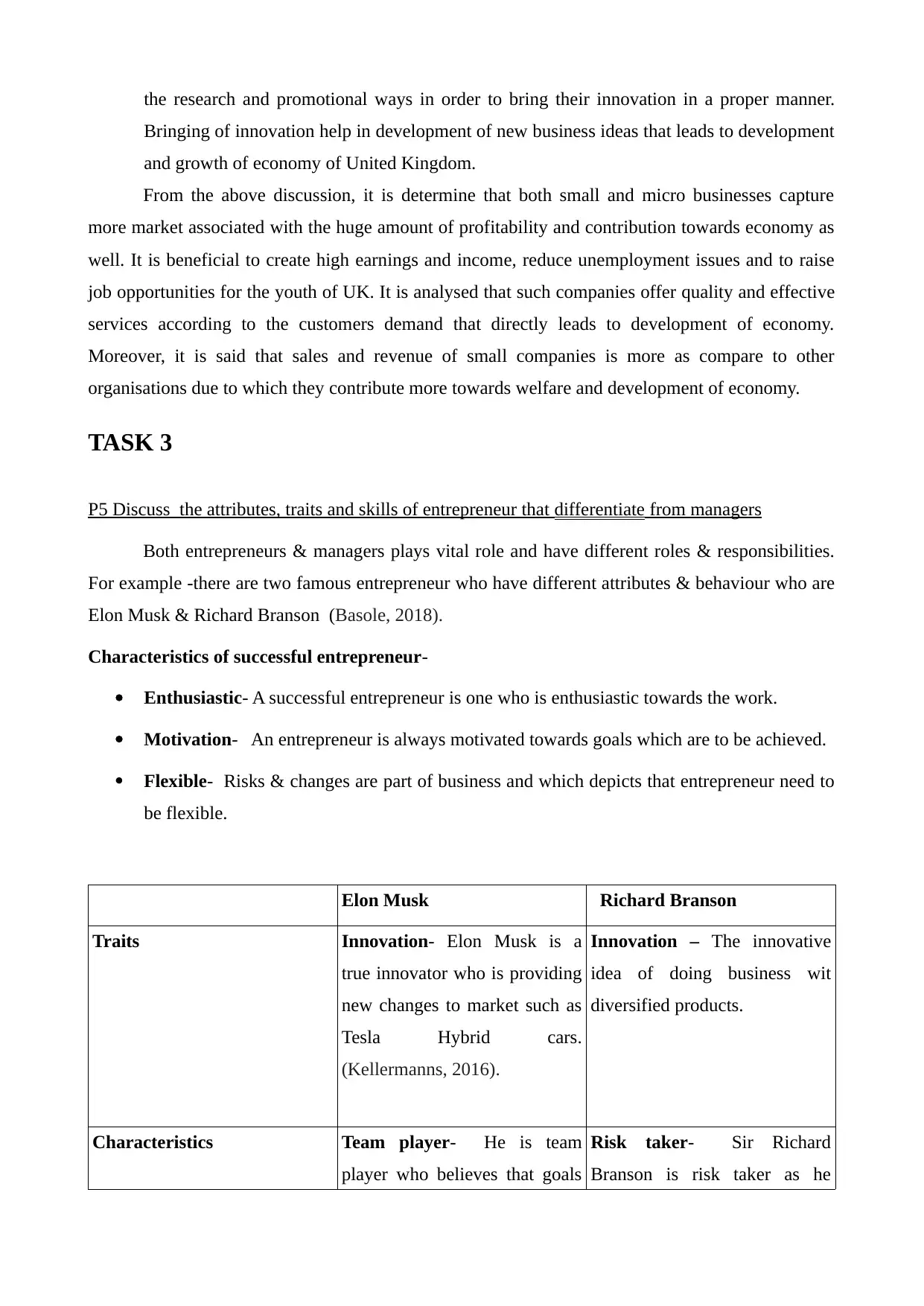
the research and promotional ways in order to bring their innovation in a proper manner.
Bringing of innovation help in development of new business ideas that leads to development
and growth of economy of United Kingdom.
From the above discussion, it is determine that both small and micro businesses capture
more market associated with the huge amount of profitability and contribution towards economy as
well. It is beneficial to create high earnings and income, reduce unemployment issues and to raise
job opportunities for the youth of UK. It is analysed that such companies offer quality and effective
services according to the customers demand that directly leads to development of economy.
Moreover, it is said that sales and revenue of small companies is more as compare to other
organisations due to which they contribute more towards welfare and development of economy.
TASK 3
P5 Discuss the attributes, traits and skills of entrepreneur that differentiate from managers
Both entrepreneurs & managers plays vital role and have different roles & responsibilities.
For example -there are two famous entrepreneur who have different attributes & behaviour who are
Elon Musk & Richard Branson (Basole, 2018).
Characteristics of successful entrepreneur-
Enthusiastic- A successful entrepreneur is one who is enthusiastic towards the work.
Motivation- An entrepreneur is always motivated towards goals which are to be achieved.
Flexible- Risks & changes are part of business and which depicts that entrepreneur need to
be flexible.
Elon Musk Richard Branson
Traits Innovation- Elon Musk is a
true innovator who is providing
new changes to market such as
Tesla Hybrid cars.
(Kellermanns, 2016).
Innovation – The innovative
idea of doing business wit
diversified products.
Characteristics Team player- He is team
player who believes that goals
Risk taker- Sir Richard
Branson is risk taker as he
Bringing of innovation help in development of new business ideas that leads to development
and growth of economy of United Kingdom.
From the above discussion, it is determine that both small and micro businesses capture
more market associated with the huge amount of profitability and contribution towards economy as
well. It is beneficial to create high earnings and income, reduce unemployment issues and to raise
job opportunities for the youth of UK. It is analysed that such companies offer quality and effective
services according to the customers demand that directly leads to development of economy.
Moreover, it is said that sales and revenue of small companies is more as compare to other
organisations due to which they contribute more towards welfare and development of economy.
TASK 3
P5 Discuss the attributes, traits and skills of entrepreneur that differentiate from managers
Both entrepreneurs & managers plays vital role and have different roles & responsibilities.
For example -there are two famous entrepreneur who have different attributes & behaviour who are
Elon Musk & Richard Branson (Basole, 2018).
Characteristics of successful entrepreneur-
Enthusiastic- A successful entrepreneur is one who is enthusiastic towards the work.
Motivation- An entrepreneur is always motivated towards goals which are to be achieved.
Flexible- Risks & changes are part of business and which depicts that entrepreneur need to
be flexible.
Elon Musk Richard Branson
Traits Innovation- Elon Musk is a
true innovator who is providing
new changes to market such as
Tesla Hybrid cars.
(Kellermanns, 2016).
Innovation – The innovative
idea of doing business wit
diversified products.
Characteristics Team player- He is team
player who believes that goals
Risk taker- Sir Richard
Branson is risk taker as he
⊘ This is a preview!⊘
Do you want full access?
Subscribe today to unlock all pages.

Trusted by 1+ million students worldwide
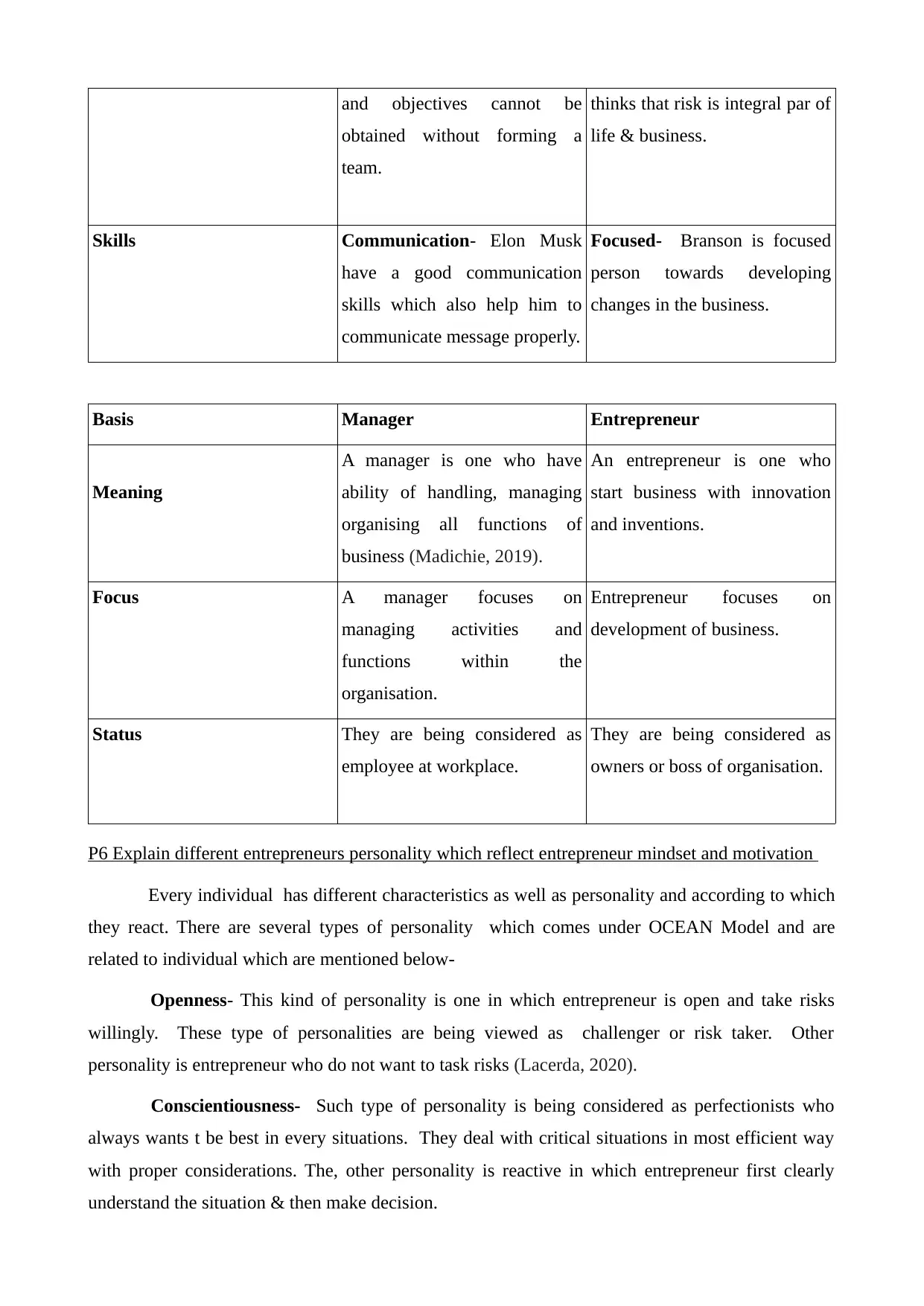
and objectives cannot be
obtained without forming a
team.
thinks that risk is integral par of
life & business.
Skills Communication- Elon Musk
have a good communication
skills which also help him to
communicate message properly.
Focused- Branson is focused
person towards developing
changes in the business.
Basis Manager Entrepreneur
Meaning
A manager is one who have
ability of handling, managing
organising all functions of
business (Madichie, 2019).
An entrepreneur is one who
start business with innovation
and inventions.
Focus A manager focuses on
managing activities and
functions within the
organisation.
Entrepreneur focuses on
development of business.
Status They are being considered as
employee at workplace.
They are being considered as
owners or boss of organisation.
P6 Explain different entrepreneurs personality which reflect entrepreneur mindset and motivation
Every individual has different characteristics as well as personality and according to which
they react. There are several types of personality which comes under OCEAN Model and are
related to individual which are mentioned below-
Openness- This kind of personality is one in which entrepreneur is open and take risks
willingly. These type of personalities are being viewed as challenger or risk taker. Other
personality is entrepreneur who do not want to task risks (Lacerda, 2020).
Conscientiousness- Such type of personality is being considered as perfectionists who
always wants t be best in every situations. They deal with critical situations in most efficient way
with proper considerations. The, other personality is reactive in which entrepreneur first clearly
understand the situation & then make decision.
obtained without forming a
team.
thinks that risk is integral par of
life & business.
Skills Communication- Elon Musk
have a good communication
skills which also help him to
communicate message properly.
Focused- Branson is focused
person towards developing
changes in the business.
Basis Manager Entrepreneur
Meaning
A manager is one who have
ability of handling, managing
organising all functions of
business (Madichie, 2019).
An entrepreneur is one who
start business with innovation
and inventions.
Focus A manager focuses on
managing activities and
functions within the
organisation.
Entrepreneur focuses on
development of business.
Status They are being considered as
employee at workplace.
They are being considered as
owners or boss of organisation.
P6 Explain different entrepreneurs personality which reflect entrepreneur mindset and motivation
Every individual has different characteristics as well as personality and according to which
they react. There are several types of personality which comes under OCEAN Model and are
related to individual which are mentioned below-
Openness- This kind of personality is one in which entrepreneur is open and take risks
willingly. These type of personalities are being viewed as challenger or risk taker. Other
personality is entrepreneur who do not want to task risks (Lacerda, 2020).
Conscientiousness- Such type of personality is being considered as perfectionists who
always wants t be best in every situations. They deal with critical situations in most efficient way
with proper considerations. The, other personality is reactive in which entrepreneur first clearly
understand the situation & then make decision.
Paraphrase This Document
Need a fresh take? Get an instant paraphrase of this document with our AI Paraphraser
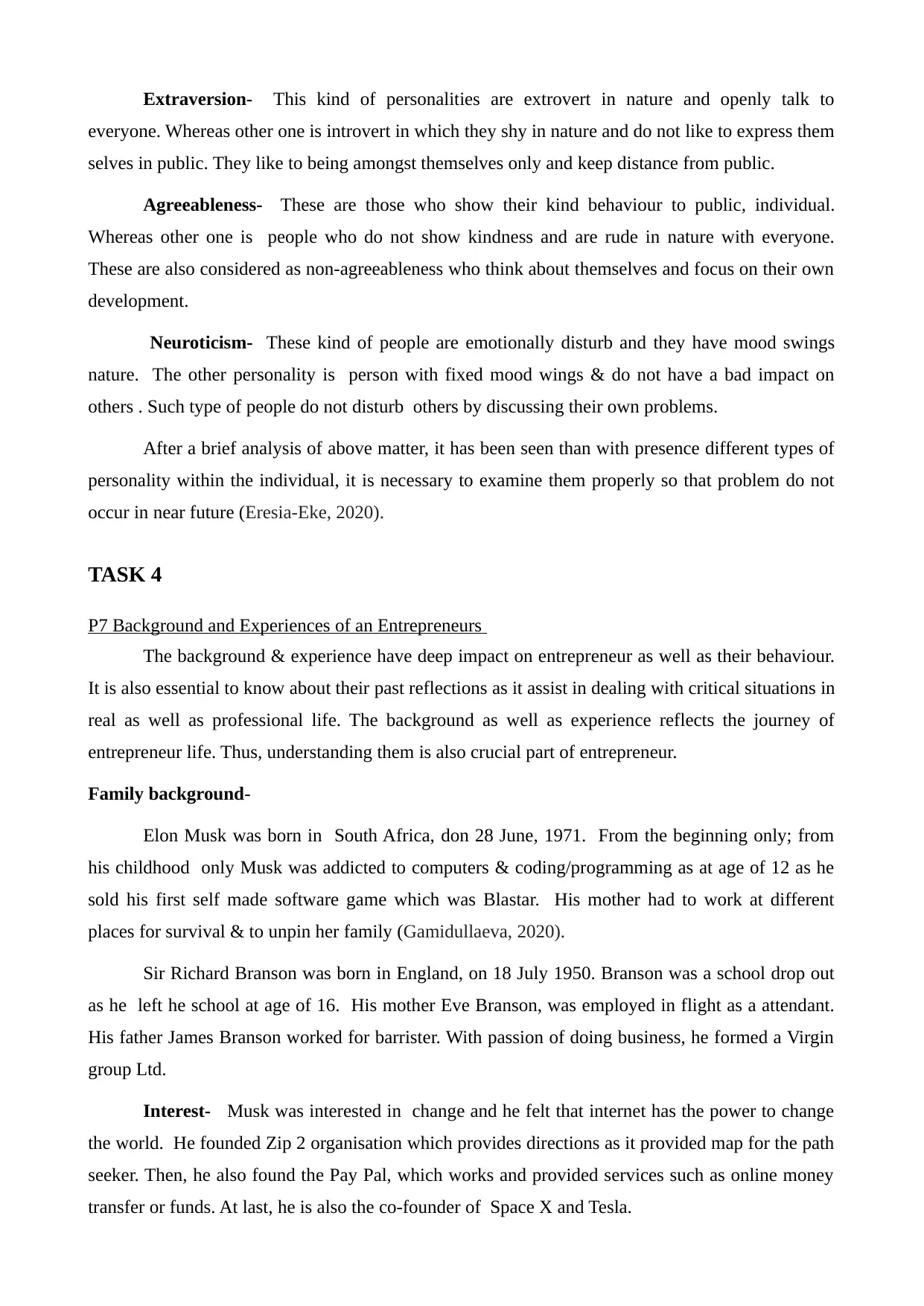
Extraversion- This kind of personalities are extrovert in nature and openly talk to
everyone. Whereas other one is introvert in which they shy in nature and do not like to express them
selves in public. They like to being amongst themselves only and keep distance from public.
Agreeableness- These are those who show their kind behaviour to public, individual.
Whereas other one is people who do not show kindness and are rude in nature with everyone.
These are also considered as non-agreeableness who think about themselves and focus on their own
development.
Neuroticism- These kind of people are emotionally disturb and they have mood swings
nature. The other personality is person with fixed mood wings & do not have a bad impact on
others . Such type of people do not disturb others by discussing their own problems.
After a brief analysis of above matter, it has been seen than with presence different types of
personality within the individual, it is necessary to examine them properly so that problem do not
occur in near future (Eresia-Eke, 2020).
TASK 4
P7 Background and Experiences of an Entrepreneurs
The background & experience have deep impact on entrepreneur as well as their behaviour.
It is also essential to know about their past reflections as it assist in dealing with critical situations in
real as well as professional life. The background as well as experience reflects the journey of
entrepreneur life. Thus, understanding them is also crucial part of entrepreneur.
Family background-
Elon Musk was born in South Africa, don 28 June, 1971. From the beginning only; from
his childhood only Musk was addicted to computers & coding/programming as at age of 12 as he
sold his first self made software game which was Blastar. His mother had to work at different
places for survival & to unpin her family (Gamidullaeva, 2020).
Sir Richard Branson was born in England, on 18 July 1950. Branson was a school drop out
as he left he school at age of 16. His mother Eve Branson, was employed in flight as a attendant.
His father James Branson worked for barrister. With passion of doing business, he formed a Virgin
group Ltd.
Interest- Musk was interested in change and he felt that internet has the power to change
the world. He founded Zip 2 organisation which provides directions as it provided map for the path
seeker. Then, he also found the Pay Pal, which works and provided services such as online money
transfer or funds. At last, he is also the co-founder of Space X and Tesla.
everyone. Whereas other one is introvert in which they shy in nature and do not like to express them
selves in public. They like to being amongst themselves only and keep distance from public.
Agreeableness- These are those who show their kind behaviour to public, individual.
Whereas other one is people who do not show kindness and are rude in nature with everyone.
These are also considered as non-agreeableness who think about themselves and focus on their own
development.
Neuroticism- These kind of people are emotionally disturb and they have mood swings
nature. The other personality is person with fixed mood wings & do not have a bad impact on
others . Such type of people do not disturb others by discussing their own problems.
After a brief analysis of above matter, it has been seen than with presence different types of
personality within the individual, it is necessary to examine them properly so that problem do not
occur in near future (Eresia-Eke, 2020).
TASK 4
P7 Background and Experiences of an Entrepreneurs
The background & experience have deep impact on entrepreneur as well as their behaviour.
It is also essential to know about their past reflections as it assist in dealing with critical situations in
real as well as professional life. The background as well as experience reflects the journey of
entrepreneur life. Thus, understanding them is also crucial part of entrepreneur.
Family background-
Elon Musk was born in South Africa, don 28 June, 1971. From the beginning only; from
his childhood only Musk was addicted to computers & coding/programming as at age of 12 as he
sold his first self made software game which was Blastar. His mother had to work at different
places for survival & to unpin her family (Gamidullaeva, 2020).
Sir Richard Branson was born in England, on 18 July 1950. Branson was a school drop out
as he left he school at age of 16. His mother Eve Branson, was employed in flight as a attendant.
His father James Branson worked for barrister. With passion of doing business, he formed a Virgin
group Ltd.
Interest- Musk was interested in change and he felt that internet has the power to change
the world. He founded Zip 2 organisation which provides directions as it provided map for the path
seeker. Then, he also found the Pay Pal, which works and provided services such as online money
transfer or funds. At last, he is also the co-founder of Space X and Tesla.

Branson was a school drop out & his main interest was in doing business from childhood
only. He faced many difficulties and challenges during his business career. He founded Virgin
Group which is a leading firm and is diversified company.
Experience-
Musk has long and good experience of doing business and also has gained knowledge from
the same. He is different from others as he is true innovator who is always ready to take risk. His
interest in computer & programming made him to become successful entrepreneur ( Kottika, 2020).
Richard Branson, has the experience in business as he established its own business at age of
16 only. Also , he gained a goodwill because of his focused idea of changes to adopt (Eresia-Eke,
2020).
only. He faced many difficulties and challenges during his business career. He founded Virgin
Group which is a leading firm and is diversified company.
Experience-
Musk has long and good experience of doing business and also has gained knowledge from
the same. He is different from others as he is true innovator who is always ready to take risk. His
interest in computer & programming made him to become successful entrepreneur ( Kottika, 2020).
Richard Branson, has the experience in business as he established its own business at age of
16 only. Also , he gained a goodwill because of his focused idea of changes to adopt (Eresia-Eke,
2020).
⊘ This is a preview!⊘
Do you want full access?
Subscribe today to unlock all pages.

Trusted by 1+ million students worldwide
1 out of 15
Related Documents
Your All-in-One AI-Powered Toolkit for Academic Success.
+13062052269
info@desklib.com
Available 24*7 on WhatsApp / Email
![[object Object]](/_next/static/media/star-bottom.7253800d.svg)
Unlock your academic potential
Copyright © 2020–2026 A2Z Services. All Rights Reserved. Developed and managed by ZUCOL.




